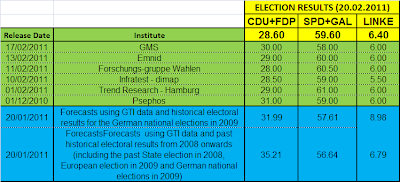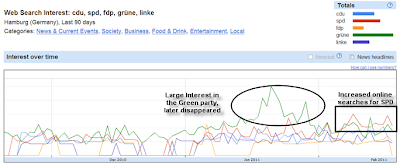SOME GOOD INDICATIONS AND SOME HOMEWORK TO DO, TOO.
(WHEN FREE TIME WILL BE AVAILABLE)
(WHEN FREE TIME WILL BE AVAILABLE)
The German state elections in Hamburg are a thing of the past and it is now time to compare the real votes with the last official polls and with our political forecasts released on the 20/02/2011 (in the morning), which we remind considered two different methods:
1) Forecasts using GTI data and historical electoral results for the German national elections in 2009;
2) Forecasts using GTI data and past historical electoral results from 2008 onwards (including the past State election in 2008, European election in 2009 and German national elections in 2009);
In order to compare the different polls and our forecasts, we use the standard forecasting evaluation statistics:
- the Root Mean Squared Error (RMSE)
- the Mean Absolute Error (MAE)
- the Mean Absolute Percentage Error (MAPE)
both for single parties and classical coalitions:

As expected and previously discussed, the elections in Hamburg was a difficult test for GTI data based models.
Particularly, we had a strong underestimation of the SPD and a contemporaneous overestimation of the Green party (Grüne), while the main coalitions and smaller parties where forecasted quite correctly. This problem was mainly due to two reasons:
- In case of German elections, online searches start to give significant indications only in the last weeks, if not days, before the election date: in this case, if I had considered only the data for the 17 and 18 of February, I would have 45% and 14% for the SPD and Grüne, respectively (instead, I used the average of the last 5 days, since it was optimal in past elections).
- Moreover, in the days (and weeks) previous to the Hamburg state elections, I noticed a very large increase of online searches for the Grüne in January 2011 which almost completely disappeared at the beginning of February 2011, together with a simultaneous increase in SPD search data. I was aware that such a quick fall in the search data for the Grüne would have implied a strong negative impact on the final result for this party, but I was reluctant to increase the level of sophistication of my model.
In general, I prefer to have a not-too complex model, able to be “roughly precise and not precisely wrong”. However, I have to admit that the local nature of this elections, together with the fact that I do not have the array of questions available to a standard political pollster to fine-tune the results, clearly suggest to include in future work the (possibly nonlinear) behavior in the past dynamics of online searches.
Needless to say, these results further encourage us in this line of work, fully aware that we are in unchartered territory, so that we proceed with the most classical “learning by doing”.
Anyway, for now I take a break: as the readers of this website know, a couple of days before the elections in Hamburg, my first child was born and my free time (and sleep) are currently quite limited ^__^ !
Gigi Bi
Comments




